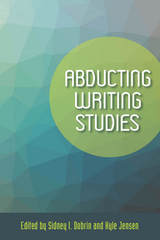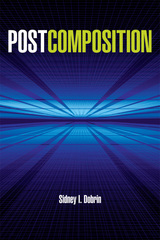2 books about Dobrin, Sidney I

Abducting Writing Studies
Edited by Sidney I. Dobrin and Kyle Jensen
Southern Illinois University Press, 2017
This collection is organized around the concept of abduction, a logical operation introduced by Charles Sanders Peirce that explains how new ideas are formed in response to an uncertain future. Responding to this uncertain future with rigor and insight, each essay imagines new methods, concepts, and perspectives that extend writing studies research into startling new terrain. To appeal to a wide range of audiences, the essays work within foundational areas in rhetoric and composition research such as space, time, archive, networks, inscription, and life. Some of the essays take familiar concepts such as historiography, the writing subject, and tone and use abduction to chart new paths forward. Others use abduction to identify areas within writing studies such as futural writing, the calling of place, and risk that require more sustained attention. Taken together, these essays expose the manifold pathways that writing studies research may pursue.
Each of the twelve essays that comprise this collection sparks new insights about the phenomenon of writing. A must-read for rhetoric and composition scholars and students, Abducting Writing Studies is sure to foster vibrant discussions about what is possible in writing research and instruction.
Each of the twelve essays that comprise this collection sparks new insights about the phenomenon of writing. A must-read for rhetoric and composition scholars and students, Abducting Writing Studies is sure to foster vibrant discussions about what is possible in writing research and instruction.
[more]

Postcomposition
Sidney I. Dobrin
Southern Illinois University Press, 2011
Leading a burgeoning self-critical moment in composition studies and writing program administration, Postcomposition is a fundamental reconsideration of the field that attempts to shift the focus away from pedagogy and writing subjects and toward writing itself. In this forceful and reasoned critique of many of the primary tenets and widely accepted institutional structures of composition studies, Sidney I. Dobrin delivers a series of shocks to the system meant to disrupt the pedagogical imperative and move beyond the existing limits of the discipline.
Dobrin evaluates the current state of composition studies, underscoring the difference between composition and writing and arguing that the field's focus on the administration of writing students and its historically imposed prohibition on theory greatly limit what can be understood about writing. Instead he envisions a more significant approach to writing, one that questions the field's conservative allegiance to subject and administration and reconsiders writing as spatial and ecological. Using concepts from ecocomposition, spatial theory, network theory, complexity theory, and systems theory, Postcomposition lays the groundwork for a networked theory of writing, and advocates the abandonment of administration as a useful part of the field. He also challenges the usefulness of rhetoric in writing studies, showing how writing exceeds rhetoric.
Postcomposition is a detailed consideration of how posthumanism affects the field's understanding of subjectivity. It also tears at the seams of the "contingent labor problem." As he articulates his own frustrations with the conservatism of composition studies and builds on previous critiques of the discipline, Dobrin stages a courageous-and inevitably polemical-intellectual challenge to the entrenched ideas and assumptions that have defined composition studies.
Dobrin evaluates the current state of composition studies, underscoring the difference between composition and writing and arguing that the field's focus on the administration of writing students and its historically imposed prohibition on theory greatly limit what can be understood about writing. Instead he envisions a more significant approach to writing, one that questions the field's conservative allegiance to subject and administration and reconsiders writing as spatial and ecological. Using concepts from ecocomposition, spatial theory, network theory, complexity theory, and systems theory, Postcomposition lays the groundwork for a networked theory of writing, and advocates the abandonment of administration as a useful part of the field. He also challenges the usefulness of rhetoric in writing studies, showing how writing exceeds rhetoric.
Postcomposition is a detailed consideration of how posthumanism affects the field's understanding of subjectivity. It also tears at the seams of the "contingent labor problem." As he articulates his own frustrations with the conservatism of composition studies and builds on previous critiques of the discipline, Dobrin stages a courageous-and inevitably polemical-intellectual challenge to the entrenched ideas and assumptions that have defined composition studies.
[more]
READERS
Browse our collection.
PUBLISHERS
See BiblioVault's publisher services.
STUDENT SERVICES
Files for college accessibility offices.
UChicago Accessibility Resources
home | accessibility | search | about | contact us
BiblioVault ® 2001 - 2024
The University of Chicago Press









